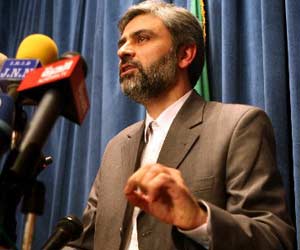
Iranian Foreign Ministry spokesman
Mohammad-Ali Hosseini addresses a speech in Tehran yesterday.
-Xinhua/Reuters
Iran yesterday reiterated its opposition to a West demand for suspending its
uranium enrichment activities, saying such a move is "absolutely unacceptable".
"The suspension (of uranium enrichment) is absolutely unacceptable and we
have rejected it," Foreign Ministry spokesman Mohammad-Ali Hosseini told a press
conference.
Hosseini's remarks came after foreign ministers or representatives from the
United States, Britain, France, Germany, China and Russia gathered in London on
Friday for talks on Iran's nuclear standoff.
After the meeting, British Foreign Secretary Margaret Beckett issued a
statement, saying that participants were "deeply disappointed" that Iran was not
prepared to suspend its enrichment-related and reprocessing activities, as
required by the IAEA Boardand made mandatory in the UN Security Council
Resolution 1696.
Hosseini said that the West demand "has no place in Iran's peaceful nuclear
program", adding "the threat of sanctions is an inefficient means to achieve a
solution."
Iranians "have always regarded the weapon of sanctions as something rotten
and outdated," he said, adding that the Iranian people "have already been used
to such sanctions and threats".
Hosseini stressed that Iran would not be the lone victim to the possible
sanctions, as the sanction-seeking countries themselves would also be affected
by such measures.
Iran "prefers talks in the framework of international regulations without any
precondition" when it comes to ways to solve the nuclear standoff and does not
want the ones that would lead to sanctions, Hosseini said.
Enrichment of uranium is at the core of the dispute over Iran's nuclear
program. The process can be used to make nuclear fuel and, in highly enriched
form, the explosive core of an atomic bomb.
Tehran insists its nuclear program is solely for peaceful energy needs. The
UN Security Council adopted a resolution in late July, urging Tehran to suspend,
by Aug. 31, all enrichment-related and reprocessing activities, including
research and development.



